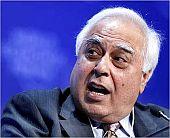 The government on Monday announced that it will introduce grading system in all Central Board of Secondary Education (CBSE) schools and make Class X board exams optional from coming academic year (2010-11).
The government on Monday announced that it will introduce grading system in all Central Board of Secondary Education (CBSE) schools and make Class X board exams optional from coming academic year (2010-11).
Union Human Resource Development minister Kapil Sibal, during a press conference in New Delhi, said: "Central Advisory Board of Education (CABE) supports making Class X examination optional in CBSE system."
"There is a pan-India consensus over the issue. So we have decided to go ahead with this," Sibal said.
The Class X board exams will become optional in all CBSE schools from the coming academic year (2010-11).
As per sources, the CBSE has prepared the format of an aptitude exam, which schools can use to test Class X students on their level of understanding in each subject. The emphasis, however, will be on continuous and comprehensive evaluation (CCE) through the year instead of a single public exam at the end of Class X.
Sibal particularly called for collaboration from state governments with regard to the Right to Education.
He pointed out that Rs 1,50,000 crore would be required for implementing the RTE in the country and it is perceived that there will be a shortfall of Rs.60,000 crore, as it would be a massive exercise.
Sibal also said that in order to provide equal opportunity to all students trying for professional courses, a core curriculum in Maths and Science needs to be formulated.
The minister also emphasised that diversity in education was to be respected and there was no intent of having a single board in the country.
With regard to higher education Sibal said that his Ministry was in the process of formulating the structure for an overarching body for higher education that would be responsible for higher education policy.
He said that some of the proposals for higher education included complete autonomy to universities for devising courses, cross fertilisation of courses and research oriented universities.
Sibal also said that he was open to the idea of Indian universities collaborating with foreign universities or with the corporate sector. He pointed out that the corporate sector was showing increasing interest in education, as they require trained manpower.







